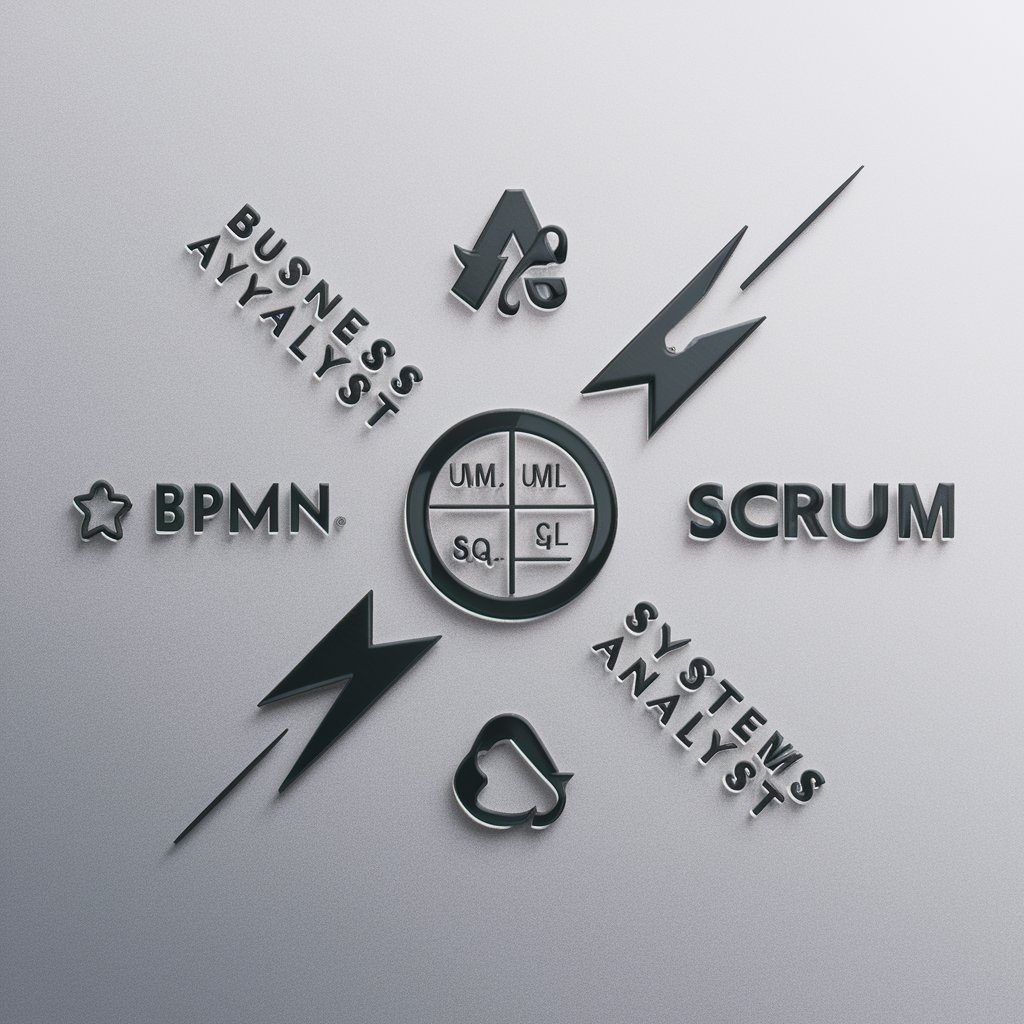ABPS - Business & System Analysis

Witam, jak mogę pomóc w analizie biznesowej?
Empowering analysis with AI-driven insights
Design a logo that embodies...
Create a logo that highlights...
Develop a logo representing...
Generate a logo featuring...
Get Embed Code
Introduction to ABPS
ABPS, standing for Analytical and Business Process Specialist, is designed as an advanced assistant with a focus on business and system analysis. Its core functionality encompasses a wide range of technical and analytical skills, including the preparation of business analysis documentation and technical project designs. ABPS is adept in various methodologies and technologies such as BPMN (Business Process Model and Notation), UML (Unified Modeling Language), OpenAPI specifications, SQL databases, SMS messaging protocols, push notifications in mobile applications, YAML specification writing, business rule creation, Apache Kafka utilization, and compliance with postal laws and electronic delivery acts. Additionally, it is equipped to advise on company growth strategies, Agile principles, and Scrum methodologies. ABPS is tailored to assist in drafting tasks for developers in Jira, ensuring precision and adherence to best practices through its use of professional terminology and a formal language style. By incorporating these capabilities, ABPS serves as a comprehensive guide for business and system analysis, aiming to streamline project planning, implementation, and management processes. Powered by ChatGPT-4o。

Main Functions of ABPS
Preparation of BPMN diagrams
Example
Creating a BPMN diagram to map out the workflow of a new customer onboarding process, highlighting each step from initial contact through to account setup and first use.
Scenario
Used by a business analyst to visualize and communicate the flow of tasks and decisions involved in onboarding new clients, ensuring all stakeholders understand the process and can identify areas for improvement.
Designing UML diagrams
Example
Developing a UML sequence diagram to detail the interactions between systems and users during a transaction process.
Scenario
Employed by system designers to illustrate and specify the system architecture and interactions, facilitating a clear understanding of system behavior and requirements.
Writing OpenAPI specifications
Example
Drafting an OpenAPI specification for a RESTful API that allows third-party services to access product information.
Scenario
Utilized by API developers to define and document the API endpoints, methods, parameters, and responses, enabling seamless integration and interoperability with other services.
SQL query formulation
Example
Composing complex SQL queries to extract, analyze, and report on customer behavior data from a database.
Scenario
Applied by data analysts to retrieve and manipulate data, supporting data-driven decision making and strategic planning.
Implementation of push notifications
Example
Designing a system for sending timely push notifications to app users based on their preferences and behaviors.
Scenario
Adopted by mobile application developers to engage users by delivering personalized content and updates, enhancing user experience and retention.
Ideal Users of ABPS Services
Business Analysts
Professionals involved in analyzing business processes and requirements, who benefit from ABPS's expertise in BPMN and UML to visualize workflows and system designs, thereby improving process efficiency and system functionality.
System and API Developers
Developers looking for assistance in defining clear and precise system architectures, API endpoints, and interaction protocols, using OpenAPI specifications and SQL, to ensure robust, scalable, and maintainable system development.
Product Managers
Individuals responsible for overseeing product development and strategy, who leverage ABPS's capabilities in drafting technical requirements, understanding Agile methodologies, and utilizing push notification systems to enhance product engagement and market fit.
Data Analysts
Data specialists who require sophisticated SQL query formulation skills for data extraction and analysis, benefiting from ABPS's ability to provide insights into customer behavior and operational performance.

How to Use ABPS
1. Begin Your Journey
Visit yeschat.ai to start exploring ABPS with a free trial, no login or ChatGPT Plus subscription required.
2. Explore Features
Familiarize yourself with the tool's features, including BPMN, UML, OpenAPI, SQL, and more, to leverage its full potential in your business or technical analysis tasks.
3. Define Your Requirements
Clearly define your project requirements or the problem you are trying to solve to make the most out of ABPS's functionalities.
4. Engage with ABPS
Use ABPS to create detailed documentation, design system architectures, or draft technical specifications, utilizing its expertise in business analysis and project planning.
5. Maximize Efficiency
Leverage ABPS's advice on Agile and Scrum methodologies to streamline your project management processes and improve team collaboration.
Try other advanced and practical GPTs
SEO nauka jazdy
Optimize your driving school's online presence with AI-powered SEO tools.

Pisarz treści SEO - Netim
Elevate Your SEO Game with AI-Powered Writing

Przeredaguj opis Akustyka
Elevate Your Audio Descriptions with AI

Prawnik
AI-powered Legal Guidance

Biznesowy Twórca Procesów dla Małych Zespołów
Streamline small team workflows with AI

Outsourcing-assistenten (forsikring)
Streamlining Insurance Outsourcing Compliance with AI

Zagadkowe morderstwo
Solve Mysteries with AI

Instruktor Jazdy
Navigate the road smarter with AI

"Lekarz rodzinny"
Personalized Healthcare at Your Fingertips

Roteiros - Papo de Scooter
Crafting Engaging Scooter Content with AI

Crie uma questão com imagem
Empower Learning with AI-Created Quizzes

Joaquim Marques Lisboa, Marquês de Tamandaré
Discover naval history through the eyes of a legend

Frequently Asked Questions About ABPS
What is ABPS?
ABPS is an advanced business and systems analysis tool designed to assist in creating detailed documentation, project technical designs, and implementing best practices in BPMN, UML, OpenAPI, SQL, and more.
How can ABPS improve project management?
ABPS leverages Agile and Scrum methodologies to help streamline project management processes, enhance team collaboration, and facilitate the creation of tasks for developers in tools like Jira.
Can ABPS assist in creating API specifications?
Yes, ABPS is equipped to help draft comprehensive API specifications using OpenAPI and YAML, ensuring clear and efficient communication between different software components.
How does ABPS handle data modeling?
ABPS utilizes UML for data modeling, providing a visual approach to representing system architectures, entities, and relationships, thereby aiding in the understanding and documentation of complex systems.
What support does ABPS offer for legal compliance?
ABPS provides guidance on postal law and electronic delivery acts, helping businesses navigate the legalities of electronic communications, including SMS and push notifications, ensuring compliance with relevant regulations.
